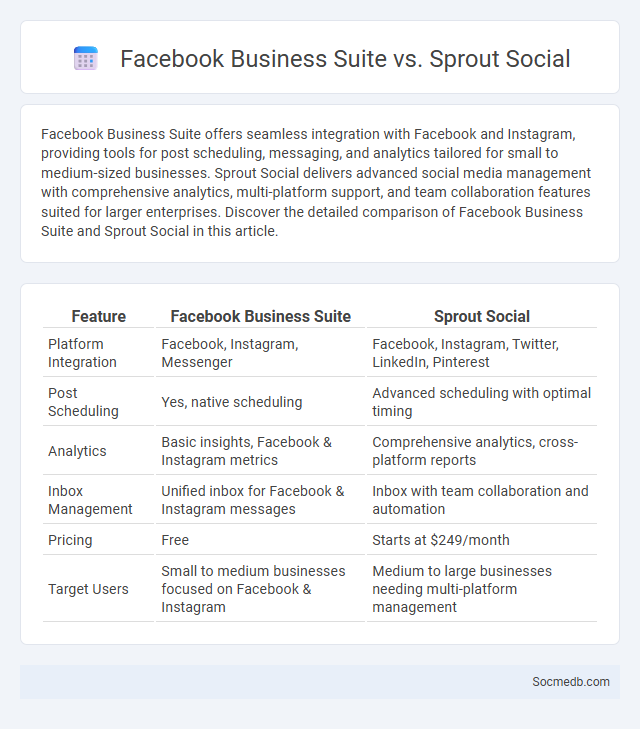
Photo illustration: Facebook Business Suite vs Sprout Social
Facebook Business Suite offers seamless integration with Facebook and Instagram, providing tools for post scheduling, messaging, and analytics tailored for small to medium-sized businesses. Sprout Social delivers advanced social media management with comprehensive analytics, multi-platform support, and team collaboration features suited for larger enterprises. Discover the detailed comparison of Facebook Business Suite and Sprout Social in this article.
Table of Comparison
| Feature | Facebook Business Suite | Sprout Social |
|---|---|---|
| Platform Integration | Facebook, Instagram, Messenger | Facebook, Instagram, Twitter, LinkedIn, Pinterest |
| Post Scheduling | Yes, native scheduling | Advanced scheduling with optimal timing |
| Analytics | Basic insights, Facebook & Instagram metrics | Comprehensive analytics, cross-platform reports |
| Inbox Management | Unified inbox for Facebook & Instagram messages | Inbox with team collaboration and automation |
| Pricing | Free | Starts at $249/month |
| Target Users | Small to medium businesses focused on Facebook & Instagram | Medium to large businesses needing multi-platform management |
Overview of Facebook Business Suite, Sprout Social, and Business Suite
Facebook Business Suite offers a centralized platform for managing Facebook and Instagram accounts, enabling efficient scheduling, messaging, and analytics tracking to enhance Your social media presence. Sprout Social provides comprehensive tools for social media management, including advanced analytics, customer relationship management, and content scheduling across multiple platforms to optimize engagement. Business Suite integrates marketing, messaging, and advertising efforts in one dashboard, streamlining Your workflow and improving insights into audience behavior for better decision-making.
Key Features Comparison
Social media platforms vary significantly in key features such as user demographics, content format, and engagement tools, with Instagram emphasizing visual content through photos and stories while Twitter prioritizes real-time text updates and trending topics. Facebook offers comprehensive networking options including groups, events, and Marketplace, contrasting with TikTok's algorithm-driven video content designed for viral reach and creator monetization. LinkedIn specializes in professional networking and career development features, supporting job postings, professional groups, and skill endorsements crucial for business-oriented users.
User Interface and Ease of Use
Social media platforms prioritize intuitive user interfaces with clear navigation menus, responsive design, and accessible features to enhance ease of use. Elements like customizable dashboards, simplified content creation tools, and seamless integration with devices improve user engagement and satisfaction. Optimized interfaces reduce learning curves, promoting longer user sessions and higher interaction rates.
Supported Social Platforms
Supported social platforms include Facebook, Instagram, Twitter, LinkedIn, and TikTok, each offering unique tools for audience engagement and content sharing. Your brand can leverage platform-specific features like Instagram Stories, Twitter Threads, or LinkedIn Articles to maximize reach and interaction. Choosing the right supported social platforms aligns your marketing strategy with audience preferences and enhances overall social media effectiveness.
Scheduling and Automation Capabilities
Scheduling and automation capabilities in social media platforms streamline content publishing by allowing users to plan posts in advance, ensuring consistent engagement across peak activity times. Advanced tools like Buffer, Hootsuite, and Later provide features such as bulk scheduling, AI-driven optimal timing, and cross-platform management to maximize reach and efficiency. These functionalities reduce manual effort, improve audience targeting through data analytics, and enhance overall social media strategy execution.
Analytics and Reporting Tools
Social media analytics and reporting tools provide in-depth insights into user engagement, sentiment analysis, and content performance across multiple platforms. These tools enable marketers to track key performance indicators (KPIs) such as reach, impressions, click-through rates, and conversion metrics to optimize campaign strategies. Advanced features often include real-time data visualization, competitor benchmarking, and automated report generation to streamline decision-making and enhance ROI.
Collaboration and Team Management
Effective social media collaboration and team management drive seamless communication and project alignment, enhancing content creation and campaign execution. Utilizing collaborative tools like Slack and Trello fosters real-time feedback and task delegation, ensuring your social media team remains organized and productive. Clear roles, combined with performance analytics, optimize strategy adjustments to maximize engagement and ROI.
Pricing and Subscription Plans
Social media platforms offer a range of pricing and subscription plans tailored to various user needs, including free tiers with basic features and premium plans that unlock advanced tools and analytics. These subscription options often differ based on factors such as user engagement limits, content promotion capabilities, and customer support levels. Choosing the right plan can enhance your social media experience by providing access to personalized features aligned with your business goals.
Pros and Cons of Each Platform
Facebook offers extensive networking opportunities and targeted advertising benefits, but your privacy may be compromised due to data sharing practices. Instagram excels in visual content sharing and influencer marketing, though it can foster unrealistic beauty standards and mental health issues. Twitter facilitates real-time news updates and direct communication, yet it often struggles with misinformation and limited character space for detailed discussions.
Which Social Media Management Tool is Best for Your Business?
Choosing the best social media management tool for your business depends on key factors like platform integration, scheduling features, and analytics capabilities. Tools like Hootsuite offer extensive platform support and robust scheduling, while Buffer provides a user-friendly interface with excellent content planning. Sprout Social excels in detailed analytics and customer engagement, making it ideal for businesses focused on data-driven social strategies.
 socmedb.com
socmedb.com